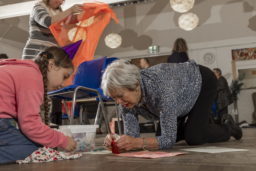
19th June 2025
Generation Mixer is a creative project connecting primary school children and local older adults through the power of imagination. By inventing and exploring imaginary worlds together, generations build meaningful bonds and discover new talents.
Young and old united in imagination – that’s Generation Mixer! Over the course of several sessions, primary school children and older people from the neighborhood co-create an imaginary world. For example, an undiscovered island. What can be found there? Who lives there? Through games, creative writing, set building, music, and a variety of art forms, this world comes to life. Every participant becomes their own invented character. In this society where anything is possible, they experience the wildest adventures.
Background
Our society faces multiple challenges: the number of older adults is increasing, while the number of care workers is declining. There are fewer primary school teachers, while the number of working parents is growing (and their involvement at school is decreasing). The realization that we need to face these challenges together is growing, but how to do so is not always clear.
At the same time, there are opportunities. Older adults are staying fit and active for longer and want to contribute to their communities — for instance, by engaging with local primary schools. At the same time, civic education is a mandatory part of the curriculum in Dutch primary schools. Children are taught to contribute to society, for example by caring for older people in their community.
Yet, connections between schools and local older adults are rarely made. Generation Mixer offers a meaningful and sustainable way to involve older people in primary schools. Research by Leyden Academy has shown that arts participation can promote positive ageing. It brings older people challenge, meaningful connections, and positive emotions (see: http://www.kunstindezorg.com).
An arts-based project like Generation Mixer, where children and older people collaborate creatively in schools, is an ideal way to connect generations and foster mutual appreciation. It’s a win-win for pupils, local seniors, and teachers alike.
“Children challenge older people to explore new boundaries and playfully tempt them to overcome their own ‘shame’… Everyone, regardless of age, has a child inside them, and if you tap into that, amazing things can happen.”
— Older participant of Generation Mixer
Objectives
Generation Mixer seeks impact at the micro, meso, and macro levels — reaching children, seniors, teachers, and the national education system. The following goals have been formulated:
- To develop the talents of both children and older adults
- To strengthen social skills and mental well-being of both groups
- To connect primary schools with (older people from) their neighborhoods
- To provide professional development and inspiration for teachers
- To develop a sustainable educational model that links civic and arts education in primary schools
“Here, older people aren’t just asked to share stories from the past, but to participate in the present. Imagination is the connecting factor. You can see how the joy of play transcends generations and sparks new energy.”
— Researcher Lieke de Kock
Background
Generation Mixer is based on the teaching method Imaginary Communities, developed and researched by Chol Theatre in Huddersfield, England. In 2023, Leyden Academy, in collaboration with Amphion Cultuurbedrijf and supported by the Dutch Fund for Cultural Participation and the Jo Visser Fund, brought this method to the Netherlands and adapted it for both children and older adults — creating Generation Mixer. The first successful pilot took place at OBS Rozengaardsweide in Hengelo, Gelderland. Leyden Academy is currently working on scaling the project within Dutch primary education.
The drama method Imaginary Communities consists of several steps that safely and actively guide participants into their imagined world. First, ideas are gathered. Then the world is built together — what places exist there? Participants slowly become characters living in that world. These characters go on adventures, facilitated by theatre educators using storytelling strategies. The method allows space for personal interpretation by artists and participants, offering flexibility in artistic forms and materials. Everyone’s ideas, talents, and stories are welcome.
Research and Knowledge Sharing
Leyden Academy documents the process and conducts research throughout the project: what happens when both children and older adults are invited to tap into their imagination and creativity? Questions asked before, during, and after the pilot include:
- What is needed to successfully adapt this method to Dutch cultural education?
- How can we further develop the method for an intergenerational audience?
- How do young and old experience the workshops, and what effect do they have on intergenerational interaction?
- How might this method be scaled up in the Netherlands and England, making it available for more cultural organizations promoting active intergenerational arts participation?
To answer these questions, we apply participatory action research, as part of the PhD research of Lieke de Kock. She is closely involved in the project’s leadership and execution. Want to learn more about Generation Mixer or participatory action research?
Contact Lieke de Kock: kock@leydenacademy.nl
The 19th Public Health and Occupational Medicine (PHOM) Conference was held on 23-24 October 2025 in Singapore, attended by Ms Susana Concordo Harding, Senior Director of the International Longevity Centre Singapore (ILC-S), Tsao Foundation.
18th November 2025
Human rights and health in old age - The role of cities and communities in Israel and abroad
ILC-Israel and the Center for Multidisciplinary Research in Aging (CMRA) organized a one-day conference entitled and unveiled a photo exhibition on 4 September 2025, at Ben-Gurion University of the Negev.
15th October 2025
Dr Alexandre Kalache celebrates an important birthday
ILC-Brazil’s president, and former ILC Global Alliance co-President, Dr Alexandre Kalache turns 80 this month, October 2025.
30th September 2025


